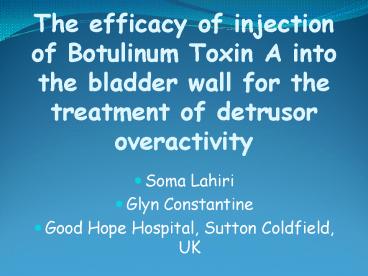The efficacy of injection of Botulinum Toxin A into the bladder wall for the treatment of detrusor overactivity - PowerPoint PPT Presentation
1 / 32
Title:
The efficacy of injection of Botulinum Toxin A into the bladder wall for the treatment of detrusor overactivity
Description:
The use of intravesical botulinum toxin type A (Botox ) for overactive bladder/urge incontinence is outside the UK marketing authorisation for the product. – PowerPoint PPT presentation
Number of Views:709
Avg rating:3.0/5.0
Title: The efficacy of injection of Botulinum Toxin A into the bladder wall for the treatment of detrusor overactivity
1
The efficacy of injection of Botulinum Toxin A
into the bladder wall for the treatment of
detrusor overactivity
- Soma Lahiri
- Glyn Constantine
- Good Hope Hospital, Sutton Coldfield, UK
2
Overactive bladder
- Urgency with or without urge incontinence
usually with frequency and nocturia (ICS) - DO Urodynamic diagnosis
3
Treatment
- Medical
- Anticholinergics
- Physiotherapy bladder training
- (physiotherapists and incontinence advisors)
- Surgical Management
- Botulinum Toxin A
- Sacral nerve root stimulation 60
- Augmentation cystoplasty and urinary diversion
- NICE Oct 2006
4
Botulinum Toxin A
- Isolated in 1897 by Van Ermengem
- First used in 1980 Strabismus
- Schurch et al 2000 Neurogenic DO in pateints
with spinal cord injury. - Rapp et al Idiopathic overactive bladder
5
Mechanism of action
- Inhibits release of Acetylcholine
- Reduced release of glutamate and substance P
6
Duration of action
- Onset of action 1- 3 weeks
- Duration of action 9 -12 months
- Chemodenervation 3- 6 months
- Sahai et al 2005
7
Complications
- Influenza-like syndrome
- Increased electrophysiological jitter or pareses
in some distant muscles (transient) - Rarely, hypersensitivity reactions
8
Contraindications
- generalised disorders of muscle activity, e.g.
myasthenia gravis - blood clotting disorders
- pregnancy breastfeeding
9
Safety in urology
- Unlicensed
- Randomised trials
- Michael et al 2009
- Brubaker et al 2008
10
Our protocol
- Patient Selection
- 2 or more anticholinergics
- Refractory to treatment
- Cant tolerate the side effects
- Urodynamics showing DO
- Bladder retraining (Outpatients)
- Excluded if voiding problems and Current UTI
- Counseling
- Unlicensed
- May need long term self-catheterisation
11
Our protocol
- Daycase under GA
- Prophylactic antibiotics for 3 days
- Follow up 4 weeks 6 months
- (patient led thereafter)
12
Dosage and sites
- 200u Botox (Botulinum Toxin A)
- Diluent 16 mls Normal Saline
- 32 sites (0.5 mls/ site 6.25u of Botox )
- Avoiding the trigone and the ureteric openings
13
Instruments
- Rigid Cystoscope (12)
- Bard Transurethral Injection system
- Injection needle 1.3cm length, 23 gauge
- Olympus system
- Injection needle 4mm length, 27 gauge
14
(No Transcript)
15
(No Transcript)
16
(No Transcript)
17
(No Transcript)
18
(No Transcript)
19
(No Transcript)
20
Cost
- Day case procedure
- Botox 200 units 284
- Needle 41.57
_______ - 325.57
21
Aim
- To look at
- Improvement in symptoms
- Duration of symptom relief
- Success of repeat injections
- Complications
22
Methodology
- Retrospective study
- Case note and electronic data review
- 2 hospital sites
- Good Hope Hospital, Sutton Coldfield
- Sir Robert Peel Hospital, Tamworth
23
Results
- n 51
- Average age 55.4y
- (Range 31 yrs to 77 yrs)
- Average parity 2
24
Results 1st injection
- Overall improvement 91
- (Quality of life)
- Daytime incontinence 80
- Frequency and urgency 75
- Nocturia 55
25
Results 2nd injection
- 65 of those who had 1st injection had 2nd
injection - Average interval between first and second
treatments 15.7 months - Success rate 93
- 28 said not as good as the first
- 6 said no improvement
26
ResultsTreatment 3
- 64 of those who had 2 injections had 3rd
injection - Average interval between the 2nd 3rd treatment
10 months - Success rate 75
27
Complication
- Urinary tract infection 12
- Retention/ Self catheterisation 3
- Pain 2
- Lack of sensation 1
28
Summary
- Improvement
- Treatment 1 91
- Treatment 2 93 Interval 15 mths.
- Treatment 3 75 Interval 10 mths.
- Complication
- UTI
29
Conclusions
- Very useful alternative
- Our regime improved symptoms without causing
retention - As efficacy reduces with number of injections, ?
increase the dose in repeat injections
30
- Acknowledgements
- Records Department
- BICOG
- Thank you.
31
Doseage Regimens described
- 200 20 sites brubaker et al 2008
- 200 300 u 40 sites schurch et al 2006
- 100 u 30 sites 26 werner et al 2006
- 300 u30 sites 10 women hajebrahimi et al
32
(No Transcript)































